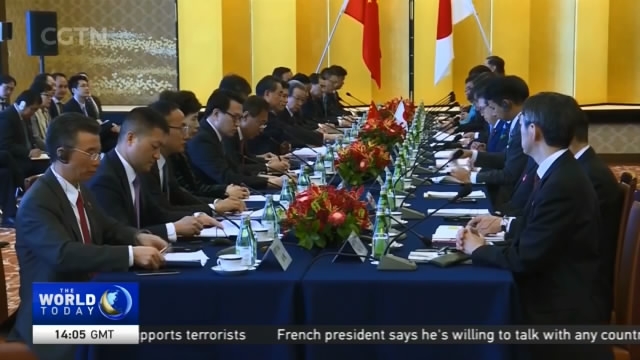
22:19, 16-Apr-2018
China-Japan Relations: Chinese FM Wang Yi holds talks with Japanese counterpart

China's Foreign Minister Wang Yi met with his Japanese counterpart in Tokyo to discuss economic cooperation, relations between the two countries, and the territorial disputes in the East China Sea. Steve Ross has more from Tokyo.
In a move that many say signals a warming in China-Japan relations, the first visit of a Chinese foreign minister to Japan for the greater part of a decade took place Sunday and Monday. It is the fourth official "Japan-China High-Level Economic Dialogue" between Foreign minister Wang Yi and Japanese foreign minister Taro Kono. Over the two days, much more than just trade policy has been on the table. Foreign minister Kono expressed the hope of the government of Japan that the two countries could work together to address concerns regarding the Democratic People's Republic of Korea.
TARO KONO JAPAN FOREIGN MINISTER "We confirmed that we would fully implement all relevant UN resolutions and to cooperate closely to establish a complete, irreversible and verifiable denuclearization of North Korea."
Other relevant regional issues up for discussion include the activity in the east China Sea, where China and Japan are involved in a dispute over uninhabited islets, as well as the vision each country has for infrastructure development in the wider Indo-Pacific region.
WANG YI CHINESE FOREIGN MINISTER "We advised both sides to have in-depth discussions regarding macro economic policies, Sino-Japanese economic cooperation and relations, the Belt and Road initiative, East Asian economic integration, and multilateral cooperation. Beginning from a new starting point, I hope to achieve our goal of developing our understanding, trust, and cooperation, by deepening our communication on a strategic and practical level."
China's fresh diplomatic overtures were viewed by some observers as Japan's long-standing efforts to effect improved regional relations. The second day of WANG'S VISIT was focused on trade policy. Wang Yi and Taro Kono agreed to work to improve bilateral relations in hopes of heading off a looming trade war between China and the United States, a trade war with strong potential negative consequences for Japan.
China and Japan seek to undo the 25 percent tariff on steel and 10 percent tariff on aluminum imports to the U.S. now imposed on both countries. On Sunday, The two sides agreed to join hands in safeguarding the multilateral trade system and in opposing protectionism. In what is effectively a push back against the U.S. tariffs, they expressed their support for World Trade Organization principles, a message that will likely reach President Trump when he meets with Japanese Prime Minister Abe in Florida on Tuesday. Steve Ross, CGTN, TOKYO.

SITEMAP
Copyright © 2018 CGTN. Beijing ICP prepared NO.16065310-3
Copyright © 2018 CGTN. Beijing ICP prepared NO.16065310-3